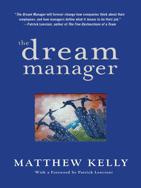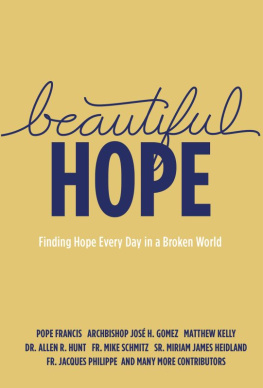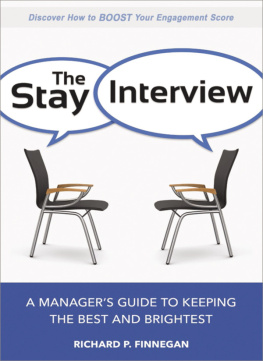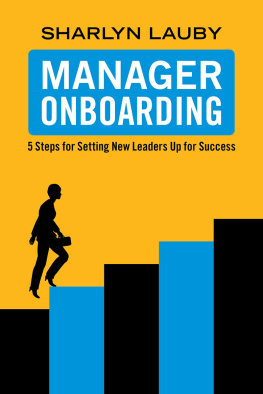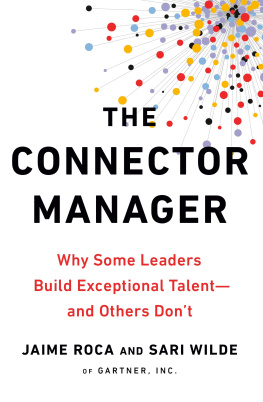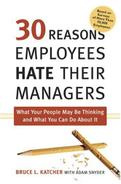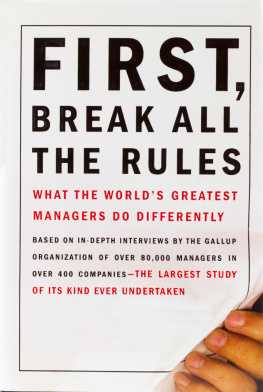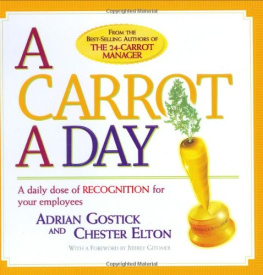
The DREAM MANAGER
MATTHEW KELLY

To my brother Simon
my first Dream Manager!
Thanks for encouraging me
to dream the big dreams
when I was so young
Go confidently in the direction of your dreams.
Live the life you have imagined!
THOREAU
Contents
Part One:
Desperation
Part Two:
The Initiative
Part Three:
Expansion
THE MOST POWERFUL ideas are almost always the simple ones. And so often, they come from unlikely sources. Matthew Kellys The Dream Manager is a testament to both of these axioms.
As long as organizations have existed, leaders have been looking for ways to inspire workers and keep them from leaving for imagined greener pastures. But during the past thirty years, as fewer and fewer people cling to the notion of staying with the same company for their entire careers, concerns about inspiring and retaining employees have grown rapidly. Today, with the increasing shortage of skilled labor in the job marketand the unprecedented leverage that it has given employeesthe search for an effective solution to the retention problem in the corporate world has become nothing short of an obsession. And for good reason.
Executives today realize that the cost of losing good people is no longer limited to higher recruiting and retraining expenses; it is a recipe for failure. Even the most cynical manager will admit that one of the most important competitive advantages a company can have is the ability to keep and motivate the human capital that is in such short supply.
Unfortunately, managers and human resources professionals have traditionally focused most of their attention on levers like compensation and benefits. Theyve raised salaries, increased bonuses, awarded stock options, increased vacation time, and let people bring their pets to workwith limited success, at best. In those cases where a company has been able to successfully use one of these tools to coax an unfulfilled employee into staying, they usually find that the solution is only a temporaryand costlyone.
The truth is, few peopleif anywork for money alone. Sure, we all need money, and we certainly factor it into our decisions about a given job. But when it comes to inspiring people and creating the kind of environment where employees laugh at the notion of leaving their company, there is something far more powerfuland less expensivethat companies have largely overlooked.
Until now.
As you read this book, youll probably have the same reaction I did. Why hasnt someone already figured this out? Its so obvious in hindsight! And that is the sign of a truly ingenious idea.
And the real beauty of Matthew Kellys breakthrough idea is that it is one of those rare discoveries that is as beneficial for employees as it is for a companys bottom line. Its like discovering a cheap and powerful new source of fuel that is also good for the environment!
The one sad thing about Matthews ideaalthough I suppose from a competitive standpoint it might be a good thingis that some managers will probably dismiss his theory. They might say, Give me a break. Thats the simplest idea Ive ever heard. Or theyll think, Who is this Matthew Kelly guy, anyway? Hes not a business or management expert Ive ever heard of.
My response to both of those objections is, Exactly!
P ATRICK L ENCIONI
author of The Five Dysfunctions of a Team
THE DREAM MANAGER
THE FUTURE OF your organization and the potential of your employees are intertwined; their destinies are linked.
An organization can only become the-best-version-of-itself to the extent that the people who drive that organization are striving to become better-versions-of-themselves. This is universally true whether the organization is a business, a school, a government, a nonprofit, or a sports team. To the extent that a CEO, an executive team, and a group of managers and employees explore their potential as individuals, so too will an organization explore its potential.
The problem is, the great majority of people in the workplace today are actively disengaged . This is the dilemma that modern managers face. To varying extents, people dont feel connected to their work, the organizations they work in, or the people they work with. No single factor is affecting morale, efficiency, productivity, sustainable growth, customer intimacy, and profitability more than this disengagement .
Disengagement. Is an employee 85 percent engaged? 60 percent engaged? 50 percent engaged? Or worst of all, have they decided to quit and stay? You do the math. What does your payroll amount to? If on average your employees are 75 percent engaged, disengagement is costing you 25 percent of your payroll every month in productivity alone. The real cost to your business is of course much higher when you take into account how disengaged employees negatively affect your customers and every aspect of your business.
It has been almost forty years since Peter Drucker observed the single greatest error and deception of our accounting system: people are placed in the liability column on the balance sheet. Machinery and computers are categorized as assets and people as liabilities. The reality, of course, is that the right people are an organizations greatest asset. We may have acknowledged this truth in theory, but we have not allowed it to sufficiently penetrate the way we manage our organizations, and indeed, the way we manage the people who drive them.
Its not that we dont want to engage the people who work with us and for us. In most cases it seems that we simply have not found a practical, efficient, and affordable way to do it.
The Dream Manager concept provides a revolutionary way of reversing this crippling trend toward disengagement and demonstrates how organizations large and small can actively engage their people once again, thus creating a competitive advantage of monumental proportions.
In the past, companies have battled over price, quality, quantity, customer service, operational excellence, and product leadership. In the coming decades, we will witness the next great corporate battlethe war for talent. The battle may seem to be raging already to some, but in truth it is only just beginning.
BusinessWeek reports that, over the next ten years, 21 percent of top management and 24 percent of all management jobs across all functions, regions, and industries will become vacant. Add to this trend an aging population, a shrinking workforce, and a growing intolerance for the illegal immigrant population that provides much of the unskilled labor in the United States today, and you have a talent and labor crisis of enormous consequence across all disciplinesfrom the highly skilled to the completely unskilled.
But it is not enough simply to hire the right people. The ability to attract, engage, and retain talent will be the number one strategic objective of every successful modern leader and organization.
A football coachs number one priority is to attract, develop, nurture, organize, and motivate the franchises talent. Coaches and team owners are intimately aware that the future success of their organization depends on the talent they attract, engage, and retain. Finding and nurturing talent is their number one priority. Why should the priorities of a CEO or manager be any different?
A companys purpose is to become the-best-version-of-itself.
The next question is: What is an employees purpose? Most would say, to help the company achieve its purpose, but they would be wrong. That is certainly part of an employees role, but an employees primary purpose is to become the-best-version-of-himself or herself. Contrary to unwritten management theory and popular practice, people do not exist for the company. The company exists for people. When a company forgets that it exists to serve its customers, it quickly goes out of business. Our employees are our first customers, and our most influential customers.
Next page
